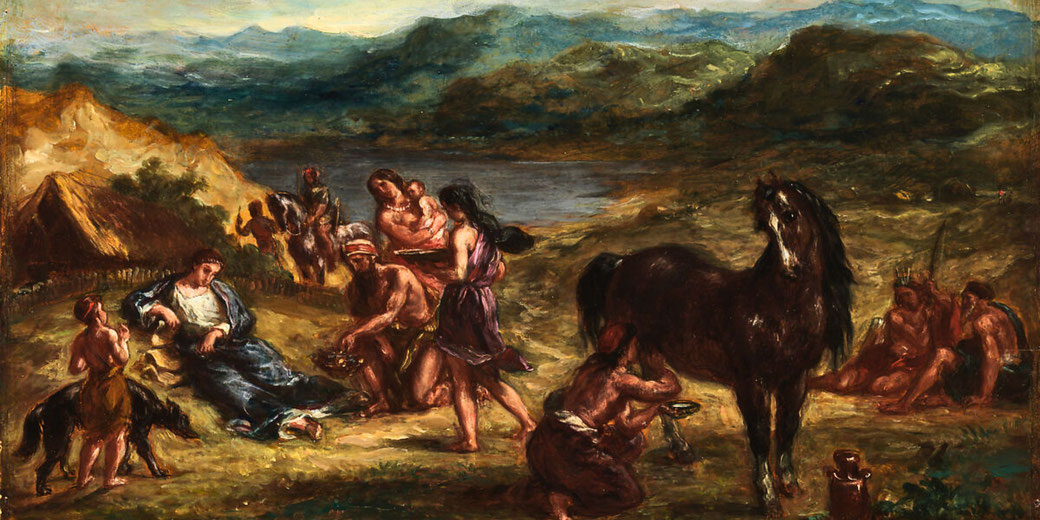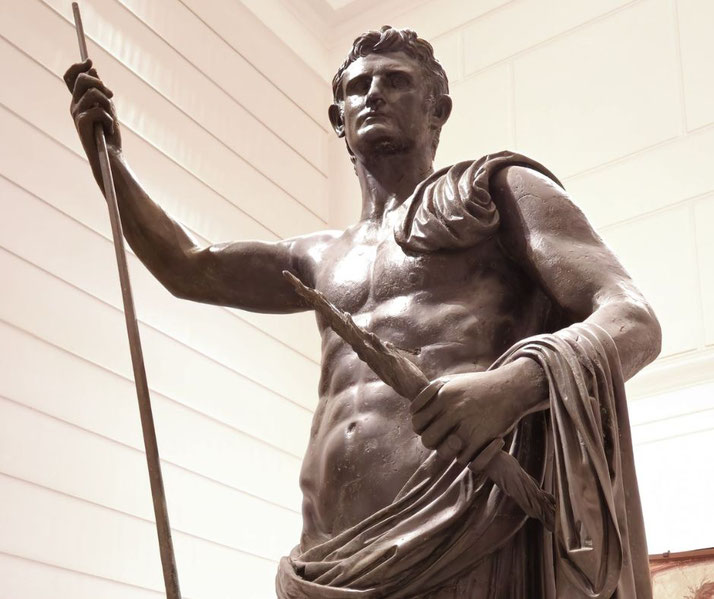Why a poet's scandalously suggestive poetry earned the wrath of a Roman emperor

During the early Roman Empire, poetry often elevated a writer’s reputation or could destroy it entirely. Ovid was one of Rome’s most well-known poets and had achieved considerable literary success before Augustus suddenly exiled him in 8 CE.
His provocative poetry and a suspected connection to a scandal likely challenged the emperor’s strict moral vision.
Ovid's rise to fame in ancient Rome
Ovid was born in 43 BCE in the Apennine town of Sulmo, approximately 140 kilometres east of Rome.
His family held equestrian rank, which gave him access to an education in rhetoric under leading instructors who were active in Rome, possibly including Arellius Fuscus.
Although his father planned a career in public service for him, Ovid rejected the cursus honorum and pursued poetry with notable success.
After he had gained attention in Rome’s literary circles, particularly those that were under the patronage of Messalla Corvinus, Ovid released Amores, a collection of elegiac poems that introduced a fictional mistress named Corinna.
Roman audiences responded enthusiastically to his skilful style, which combined references to myths with humour and an urban polish.
He adapted the elegiac couplet with fresh energy and helped elevate it to a dominant poetic form among younger writers.
As his career advanced, he produced Heroides, which presented imagined letters from mythological figures, including women abandoned by heroes and, in later additions, men addressing their lovers.
These poems, which were written in the first person, captured emotions such as betrayal, longing, and defiance with clear realism.
When he gave voice to female figures from myth, Ovid demonstrated creative confidence and a careful understanding of literary tradition.
His work developed alongside that of other elegiac poets such as Propertius and Tibullus, although Ovid’s tone remained more playful and his themes more provocative.
Meanwhile, poets such as Virgil and Horace, who aligned themselves more closely with Augustus’ political programme, promoted Roman virtues and imperial destiny.
The turning point in his career arrived with Ars Amatoria, a three-part manual that offered advice on romantic seduction.
The work stood out for its wit and its unapologetic treatment of extramarital affairs.
The poem specifically advised readers on where to find lovers, how to win their trust, and how to hide affairs from suspicious spouses.
Ovid thereby created a work that openly defied traditional Roman values.
With the publication of Metamorphoses around 8 CE, Ovid secured his place among the top literary figures.
This long-form poem, which was in dactylic hexameter, presented approximately 200 myths centred on transformation, from the world’s creation to the deification of Julius Caesar.
Many readers praised its variety and skill. However, the cultural climate in which it appeared had grown increasingly rigid, and Ovid’s earlier works consequently carried new political risks.

The dangerous times of Augustus' power in Rome
Augustus had transformed Roman politics following his victory at Actium in 31 BCE.
He had claimed to restore the Republic, but in practice secured control over the army, the Senate, and the treasury.
As he expanded his influence across Rome and the provinces, he presented himself as a guardian of peace and religious tradition.
To reinforce his authority, Augustus implemented a series of social reforms primarily aimed at public morality.
The Leges Juliae, passed in 18 BCE, aimed at what he saw as moral decline by rewarding marriage and childbearing and punishing adultery.
One of these laws, the Lex Julia de adulteriis coercendis, treated extramarital sex as a public crime rather than a private offence.
These laws largely aimed to stabilise the elite by ensuring the legitimacy of children and the behaviour of aristocratic women.
Prominent individuals such as Julia the Elder and, years later, Julia the Younger, who were both members of Augustus’ own family, faced exile under accusations of adultery, with the laws providing a convenient legal framework for their removal, which showed that the emperor intended to apply moral discipline even to the highest levels of society.
Most writers had to work within these new rules. Those who supported Augustus' aims, such as Virgil and Horace, celebrated order and piety and promoted the idea that Rome held a destined role under imperial guidance.
Their poems supported the Augustan vision without offending censors or damaging their reputations.
Unlike these poets, Ovid refused to adjust his themes or style to match imperial expectations.
Ars Amatoria treated adultery as an entertaining subject and mocked moral restrictions.
As a result, the poem largely contradicted the messages that Augustus tried to promote.
The poem instructed men on how to pursue lovers discreetly and advised women on how to maintain secrecy in illicit affairs.
Because this advice encouraged behaviour that Augustus sought to prevent, the poem became a direct challenge to his authority.
Its popularity among the Roman elite probably intensified the problem. Many of those who read Ars Amatoria belonged to the same social class targeted by the moral reforms.
As a result, Ovid's work appeared threatening and dangerous. Because he undermined public discipline through private entertainment, he drew the attention and eventual punishment of the emperor.
Why Augustus was outraged with and exiled Ovid
Ovid's exile to Tomis in 8 CE seemingly came without a formal trial or public explanation.
When he later wrote about the decision, he described his offence as a carmen et error, "a poem and a mistake".
The poem was widely believed to be Ars Amatoria. As for the error, Ovid left the details vague.
Some historians suggest he may have witnessed behaviour among the imperial family that he had failed to report.
Others believe he may have been indirectly involved in a scandal surrounding Julia the Younger, Augustus’ granddaughter, who faced exile the same year for repeated acts of adultery.
Since Ovid had moved within elite literary and social circles, even casual involvement could have put him at significant risk.
Ronald Syme and other modern historians have proposed that the poet may have had knowledge of politically sensitive behaviour connected to the imperial succession.
Augustus chose relegatio, which was milder than full banishment or execution, and indicated that he wanted Ovid removed from public life without erasing his status completely.
This milder form of exile allowed Ovid to keep his citizenship and some personal rights, though it likely reduced his influence and limited his access to property.
Although he could continue writing, his influence in Rome would be broken.
Ovid responded by composing a series of appeals to both Augustus and, later, to Tiberius.
These pleas, which were expressed in elegiac verse, stressed his loyalty, claimed ignorance of wrongdoing, and requested a second chance.
He praised the emperor’s justice, offered repentance, and distanced himself from the interpretations of his past poetry.
Despite his efforts, no response ever came.
The silence from the emperor made Ovid’s punishment irreversible. Augustus had made it clear that artistic talent could not excuse defiance of state authority.
As a consequence, Ovid became both an exile and an example to others about the limits of poetic freedom under imperial rule.
Ovid's miserable life in exile
Tomis, on the edge of the Roman Empire near the Black Sea, proved to be a harsh and alien place for Ovid.
Isolated from Rome’s cultural life and surrounded by foreign languages and unfamiliar customs, he felt cut off from everything that had once inspired him.
The weather and the distance, combined with the lack of companionship, deepened his sense of abandonment.
He described the region’s inhabitants, the Getae and Sarmatians, as warlike and unrefined, and he often complained about the bitter cold and constant danger from raids.
From this remote outpost, Ovid produced two major collections of poetry: Tristia and Epistulae ex Ponto.
These works, which mainly expressed his sorrow and desperation, did so with plain honesty.
He described his suffering in physical and emotional terms and portrayed himself as a man stripped of joy and honour and effectively left without purpose.
His earlier confidence disappeared, replaced by mourning and pleading.
In the hope of winning release, Ovid had written to senators, patrons, and imperial officials.
Each letter, which repeated his regret and loyalty, expressed an earnest desire to return.
To increase his chances, he praised the emperor's mercy, honoured Roman values, and even showed interest in the customs of his new home.
Yet none of these gestures secured a pardon.
Several years passed without any clear change in his condition. Cut off from the city where he had once enjoyed admiration, he remained in exile until his death, which likely occurred around 17 or 18 CE, based on indirect evidence.
Without formal recognition or a chance for reconciliation, Ovid faded from public view.
His final verses captured a voice of suffering and showed apparent endurance in the face of imperial silence.
Although the emperor had silenced him, later generations preserved his writings.
Students studied his metre, and scholars admired his storytelling, and poets drew inspiration from his inventive retellings of myths.
Although Augustus never rehabilitated him, later generations of Roman readers preserved and admired Ovid’s work.
His fate warned writers that Rome under Augustus rewarded loyalty but punished defiance, even when it came in the form of verse.
What do you need help with?
Download ready-to-use digital learning resources
Copyright © History Skills 2014-2025.
Contact via email
With the exception of links to external sites, some historical sources and extracts from specific publications, all content on this website is copyrighted by History Skills. This content may not be copied, republished or redistributed without written permission from the website creator. Please use the Contact page to obtain relevant permission.





